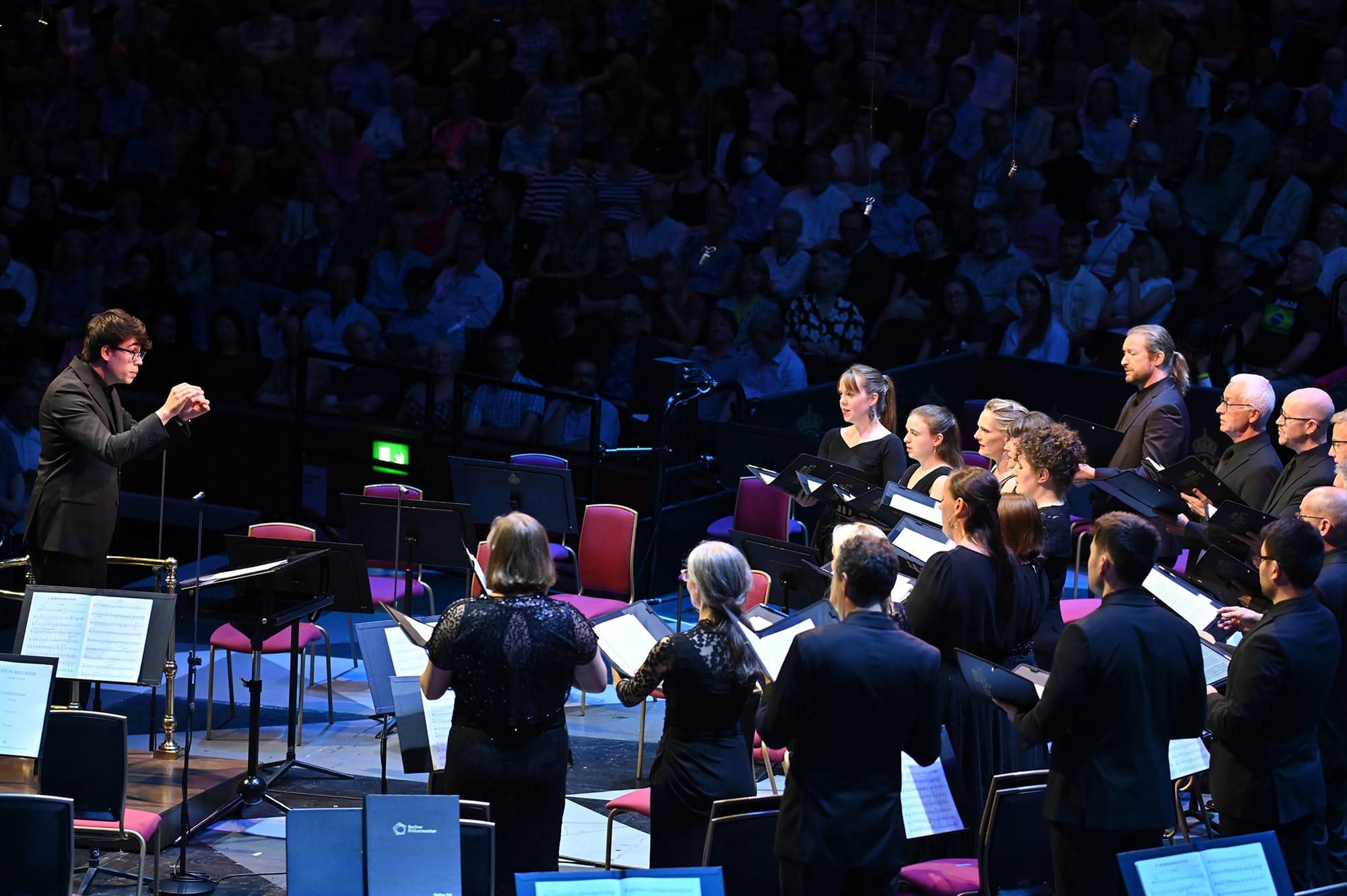Bruckner BBC Singers / Owain Park (conductor); Berliner Philharmoniker / Kirill Peternko (conductor). Royal Albert Hall, London, 1.9.2024
Bruckner Os justi (1879). Locus iste (1869). Chrisus factus est (1884)
Symphony No. 5 in B flat (1875/6, rev. 1877/8)
The annual concerts by the Berliner Philharmoniker on tour are always a Proms highlight. The second concert was taken up by Bruckner’s Fifth Symphony, a piece I last heard in Dresden in May this year. The performers on that earlier occasion were the Royal Concertgebouw Orchestra and the conductor Klaus Mäkelä, a performance of much accuracy but which missed the larger structure (review).
Here in London, and continuing the celebrations of Bruckner’s birth centenary in 2024, Kirill Petrenko offered the ideal balance of detail and structure. If not quite so transparent in texture as Makela (the core Berlin sound doubtless part of this), there is no doubt which conductor fully understood the score. Petrenko’s Bruckner is stunning.
The symphony was not in splendid isolation here, though: it was preceded by a ‘mini-choral symphony’ (Owain Park’s words) of thee motets: Os justi, Locus iste, and Christus factus est, the pieces naturally leading to the drama of the third. Right from the first chord of Os justi, everything was perfectly balanced. An Allegri Miserere soprano leap to the stratosphere was wonderful. The ability of the BBC Singers to hold a capacity audience’s attention at dynamics from piano to pianississimo was markable, as was the choirs’ unanimity at the plainchant-like final line. The text of that motet is taken from Psalm 37; the text of Locus iste is that of a Latin gradual, heard here in a beautifully smooth performance, its harmonies reaching up to, and potentially beyond, the stars. Finally, the mysticism of Christus facus est, its sections perfectly marked (at ‘Propter quod et Deus exultavit illum,’ its line striving ever upwards).

The BBC Singers exudes professionalism; as a full-time ensemble, they act as one unit, and there is no sense of strain, ever.
The Royal Albert Hall’s acoustic is perfect for this – and the hall basically acts as a secular cathedral to music for the Proms, after all. The acoustic fits Bruckner’s symphonies well, too. The Fifth Symphony, which sits somewhere in the shadows of No. 4 in terms of frequency of performance, is no exception. As the BBC Radio 3 interval talk (ercommended listening) acknowledged, this was Petrenko’s first Bruckner. That it should be birthed so fully formed and yet replete with detail is all the more remarkable.
The layout was such that a line of double-basses extended up the left (first violin) side of the orchestra, which seemed to emerge, in sonic terms, as something of a grounding spine to the sound. The counterpoint above seemed primal, the tutti arpeggio almost struggling to find the higher pitch regions. Nothing, surely, compares with the Berlin brass sound, absolutely resplendent here. But what was so impressive was the clear delineation of tempi by Petrenko. The actual choice of those tempi seemed perfect throughout – a testament to the convincing nature of this interpretation. Silences, unsurprisingly for this conductor but by no means the norm elsewhere, were impeccably counted. Individual contributions were uniformly stunning: one has to acknowledge Principal Horn Stefan Dohr’s astonishing accuracy and brilliant solos from Jonathan Kelly (oboe) and Wenzel Fuchs on clarinet.
That is, though, the tip of the iceberg: a perfectly blended horn section, glowing flute solos. But most of all it was the collective vision honed by Petrenko that gave the music its dynamism, a fist movement dynamism heard in contrast to the slowly unfolding second movement. The oboe (then oboe and bassoon in octaves) ushered in, in their disjunct intervals, a feeling of underlying disquiet. This was no place of rest. Little details acted as reminders as to why the Berliner Philharmoniker is the top of the orchestral tree: an arpeggio passed between horn and clarinet was almost ridiculously smooth.
Perhaps an aspect of that disquiet is the marked contrasts of the Scherzo, the juxtapositions perfectly judged here; and Petrenko did not shy from revealing the inherent Modernism of some passages. That sense of compositional adventure persisted into the finale, with its remarkable examination of themes (with solo clarinet as commentator) and its mix of a lifted, sometimes almost breezy mood with music of great rigour. One thing came through strongly: Petrenko is just so in control of his forces on a micro level. Detail is off the scale, so perhaps here a parallel can to be made with Abbado, and yet Petrenko’s conducing has a touch more depth.
Petrenko’s respect of Bruckner’s score is beyond question. There was no doubt we were hearing a truly great Bruckner symphony, from first to last, and there was a sense of wonder at the composer’s processes throughout, as if the players were discovering it for the first time.
Utterly remarkable. There is no doubt that this was a most satisfying concert crowned by a stunning Fifth. Intriguingly, in September, Petrenko couples the Fifth with Wolfgang Rihm’s IN SCRIFT; of course ,how we hear Bruckner’s edifice is affected by what is around it, so that will doubtless be a stimulating occasion.








